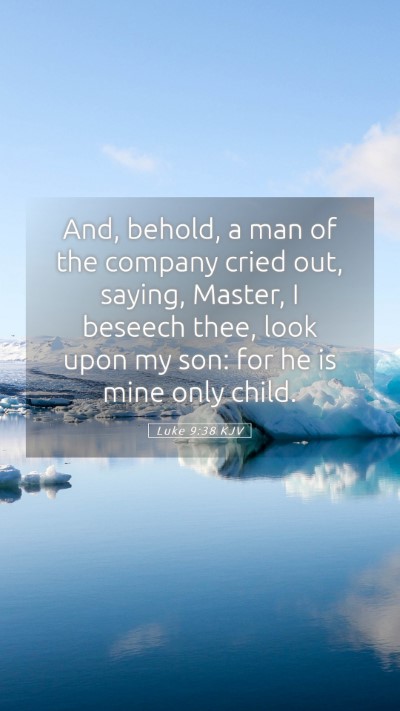Understanding Luke 9:38
Luke 9:38 states:
“And, behold, a man of the multitude cried out, saying, Master, I beseech thee, look upon my son: for he is mine only child.”
This verse encapsulates the desperation and faith of a father seeking help for his son. In this passage, we see a vivid scene illustrating the human condition, need, and reliance on divine intervention.
Bible Verse Meaning
The meaning of Luke 9:38 can be unpacked through the insights of notable commentaries:
- Matthew Henry: Henry emphasizes the emotional turmoil of the father, highlighting the love and desperation he feels for his only child. He also notes the significance of the father's plea, recognizing Jesus as the one who can provide healing. This moment illustrates the broader theme of Christ's compassion towards human suffering.
- Albert Barnes: Barnes explains that the multitude's reaction shows the public's awareness of Jesus' miraculous powers. The father’s approach signifies a profound faith; he seeks Jesus out publicly, indicating his belief in Jesus as the source of healing and salvation for his son. Barnes points out that this incident shows the importance of bringing our struggles and afflictions before Christ.
- Adam Clarke: Clarke delves into the cultural context, noting the significance of the child as ‘the only one’ stressing both the emotional weight of the request and its rarity in that societal framework. Clarke notes that this reflects a deeper spiritual truth regarding our relationship with God and the importance of faith in requesting divine aid.
Detailed Analysis
The cry of the father reveals critical insights into biblical themes:
- Desperation and Faith: It demonstrates the interplay between desperation and faith. The father’s willingness to seek Jesus highlights the necessity of approaching God with our deepest needs.
- The Role of Intercession: The father serves as an intercessor for his son, showing that we are often called to pray and seek help not just for ourselves but for those we love.
- Compassion of Jesus: The plea reflects Jesus' mission on earth to bring healing and restoration, reminding readers of His empathy toward human suffering.
Application of This Verse
Understanding Scripture encourages believers to reflect on their own lives:
- How do we respond in times of crisis? Are we quick to seek God as the father sought Jesus?
- This passage encourages believers to bring their needs before God with faith, trusting in His ability to heal and restore.
- It shows the importance of community and support in our spiritual journeys, exemplified by the crowd that witnessed this interaction.
Bible Study Insights
When delving deeper into biblical exegesis, it's beneficial to consult various Bible study tools and resources to gain a broader understanding. This verse can be included in:
- Bible study lessons focused on faith and healing.
- Discussion topics relating to Jesus' miracles and compassion.
- Explorations of parental roles and spiritual intercession in the Bible.
Cross References
Luke 9:38 connects well with several biblical themes found in:
- Matthew 17:14-18: The account of the healing of a boy possessed by a demon.
- Mark 9:17-27: Another perspective on the healing of the epileptic boy.
- John 4:46-53: The story of a nobleman’s son being healed by Jesus, emphasizing the need for faith.
Conclusion
In conclusion, Luke 9:38 serves as a profound illustration of faith amid adversity, revealing the compassionate nature of Jesus and their pivotal dynamic. By incorporating insights from various public domain commentaries, we can appreciate its depth and apply its lessons to our lives, enriching our Bible study experience.


